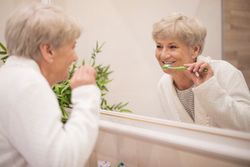
Dental hygiene is a facet of senior care that is often overlooked. While brushing and flossing will provide positive results, further attention needs to be paid to oral health. As people age, the mouth changes as well. If you have an aging loved one in your life, find out how they can prevent dental care issues from developing.
How Does Age Affect Dental Health?
The elderly are more prone to gum disease (periodontitis) due to an increased build-up of bacteria and plaque. When it goes untreated, periodontitis will swell and irritate the gums, causing bleeding. Bacteria in the mouth can then access the bloodstream through the gums, increasing the likelihood of heart attacks and strokes.
Diabetes is also a factor. Gum disease impedes the body’s ability to use insulin. It will increase blood sugar levels, making seniors susceptible to diabetes. In turn, people with diabetes are at a higher risk of developing gum disease, making regulating blood sugar more challenging.
Seniors often experience dry mouth due to medications, poor nutrition, or long-term conditions. Saliva protects the teeth from cavities and gum disease by washing away errant food particles and removing acids that can impact the enamel. It also contains antimicrobial agents, which combat bacteria linked with tooth decay, cavities, and periodontitis. Without saliva’s defense, seniors will be more vulnerable to plaque and bacteria.
What Are Tips for Maintaining Oral Hygiene?
 Due to conditions like arthritis, elderly loved ones may not be able to brush or floss as thoroughly as before. Senior care communities offer registered and trained nursing staff to help them maintain their oral hygiene. Since the elderly often have sensitive gums, supplying them with a soft-bristled or electric toothbrush can also help.
Due to conditions like arthritis, elderly loved ones may not be able to brush or floss as thoroughly as before. Senior care communities offer registered and trained nursing staff to help them maintain their oral hygiene. Since the elderly often have sensitive gums, supplying them with a soft-bristled or electric toothbrush can also help.
Drinking more water will wash away food particles and debris. Seniors with dry mouth should avoid using an alcohol-based mouthwash, as it will dry the mouth further. Several mouthwash brands are designed for those with dry mouth. They have xylitol as an active ingredient, which is a natural non-sugar sweetener. It lowers the risk of tooth decay by removing harmful bacteria while leaving good bacteria intact.
To stimulate saliva production, seniors should chew sugar-free gum or suck on sugar-free candies that also contain xylitol. Dentists may also recommend an over-the-counter saliva substitute as part of a senior care dental plan.
Twice-annual dentist appointments should be maintained. However, seniors may experience noticeable changes in their oral health between visits. If they’re in assisted living, they can use the on-site clinic for a consultation before seeing a doctor.
The senior care providers at Longhorn Village encourage oral hygiene by offering healthy meals and an on-site clinic with skilled and registered nurses on-call 24/7. They also provide comprehensive rehabilitation services, including physical, speech, and occupational therapy, and exciting social activities. To see more of Longhorn Village’s beautiful estate in Austin, TX, visit their website. For more information on their services, call (512) 266-5600 or (512) 382-4664.
About the Business
Have a question? Ask the experts!
Send your question

